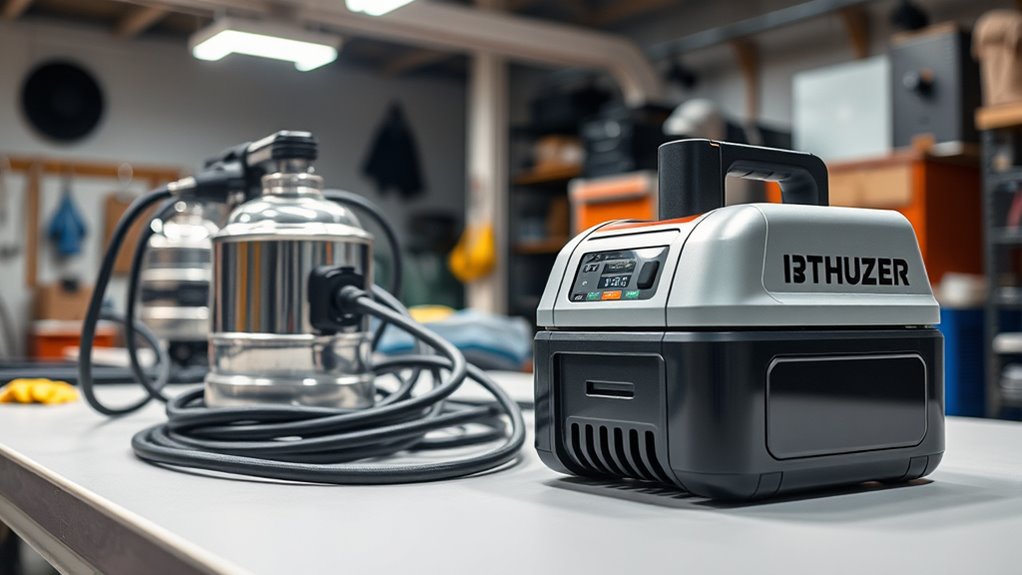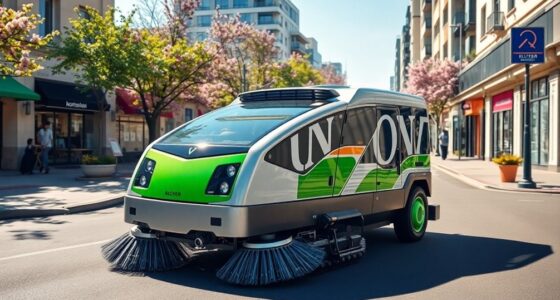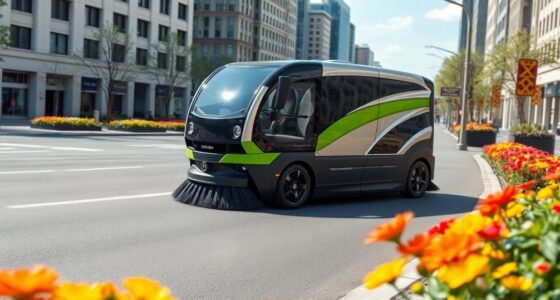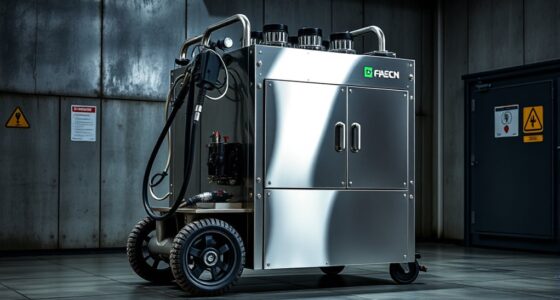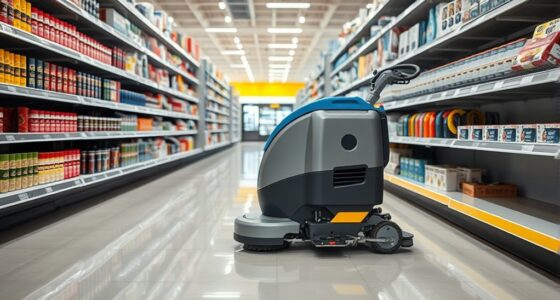Choosing between corded and battery specialty machines impacts your safety and ROI substantially. Corded options offer steady power and are generally more reliable for heavy-duty tasks, but they pose tripping hazards and reduce workspace mobility. Battery-powered machines improve safety by eliminating cords, increase portability, and can boost productivity in tight or outdoor spaces. However, they might need more maintenance due to battery life limitations. To discover which suits your needs best, explore the detailed benefits and considerations ahead.
Key Takeaways
- Corded machines offer consistent power, reducing performance disruptions that can negatively impact ROI during prolonged tasks.
- Battery-powered machines enhance safety by eliminating tripping hazards associated with cords, reducing workplace accidents.
- Corded models typically have lower upfront costs and maintenance, offering better long-term ROI for steady, heavy-duty use.
- Battery machines improve workspace safety through greater mobility and reduced clutter, but may require battery replacements affecting ROI.
- Choosing between them depends on task duration, safety priorities, and cost efficiency, balancing immediate safety with long-term productivity.
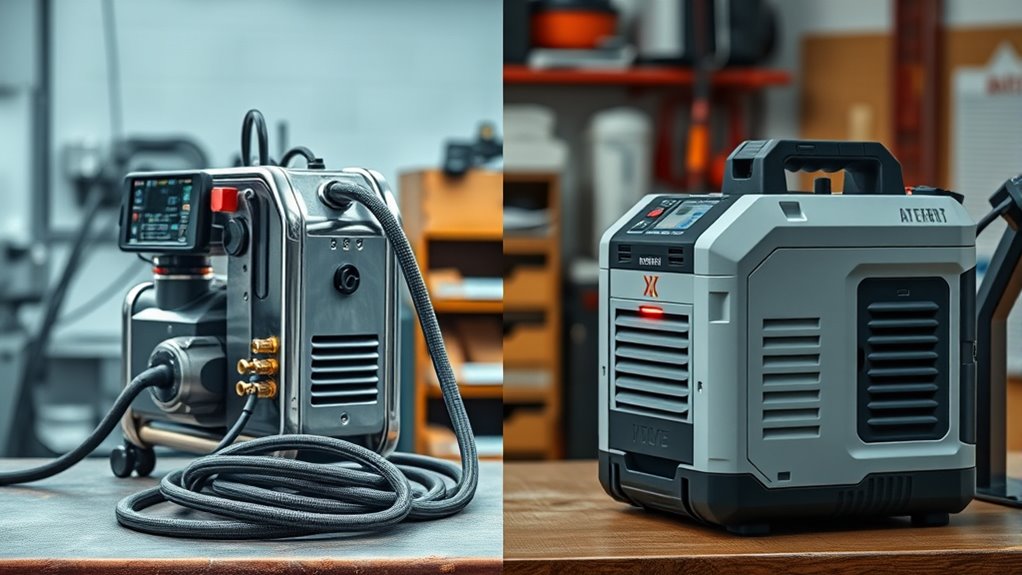
When choosing between corded and battery-powered specialty machines, understanding their differences can help you make the best decision for your needs. If you prioritize wireless mobility, a battery-powered machine offers significant advantages. Without a cord tying you to an outlet, you can move freely across your workspace, reach tight corners, and work in areas without easy access to power sources. This flexibility increases efficiency and reduces the risk of tripping over cords. However, it’s essential to consider power consistency. Battery-powered machines can sometimes experience fluctuations in performance as the battery drains, leading to reduced power output during extended use. Modern batteries have improved significantly, but they still may not match the steady power supply of corded models, especially during demanding tasks.
Battery-powered machines offer mobility but may experience performance fluctuations as batteries drain.
Corded machines excel in delivering consistent power because they draw electricity directly from an outlet. This means you won’t experience drops in performance due to battery depletion, making them reliable for prolonged, heavy-duty work. If your tasks require sustained power, such as continuous sanding, cutting, or polishing, a corded machine ensures you don’t lose momentum. On the flip side, cords can limit your mobility and pose safety hazards if not managed carefully. You might find yourself constantly navigating around cords or needing multiple extension cords, which can clutter your workspace and increase the risk of accidents.
Battery-powered machines tend to be more lightweight and portable, making them easier to handle over extended periods. This reduced weight can decrease fatigue, especially during longer projects. They’re ideal for quick jobs or environments where plugging in isn’t practical, such as outdoor work sites or locations with limited power outlets. However, keep in mind that battery life is finite. You’ll need to plan for recharging or swapping batteries during longer tasks, which could interrupt your workflow. Additionally, the initial investment in high-capacity batteries and chargers can be higher, but the convenience of wireless mobility often offsets this cost.
In contrast, corded machines are typically more budget-friendly upfront and require less maintenance since they don’t rely on batteries. They’re dependable for consistent performance but at the cost of reduced mobility and added safety considerations. When weighing your options, think about the environment you’ll be working in, the nature of your tasks, and your priority between uninterrupted power and unrestricted movement. Balancing these factors will help you select a machine that offers the optimal safety and return on investment. Moreover, advances in sound healing science and understanding vibration frequencies can also inform the development of more ergonomic and safe power tools, emphasizing the importance of considering health and safety in equipment choices.
Frequently Asked Questions
How Does Machine Weight Impact User Fatigue During Extended Use?
You’ll likely experience less fatigue during extended use with lighter machines, as weight considerably impacts ergonomics concerns. A heavier machine can cause strain on your muscles and joints, making fatigue management more challenging and increasing discomfort. Choosing a machine with a balanced weight helps you maintain proper posture and reduces fatigue, allowing you to work longer without compromising safety or performance. Always consider weight to improve comfort and efficiency.
What Maintenance Differences Exist Between Corded and Battery Specialty Machines?
You’ll find that corded machines require less maintenance, mainly needing regular cord checks and motor cleaning to prevent wear. Battery specialty machines, on the other hand, demand more attention with battery upkeep, including charging cycles, storage, and occasional replacement. Keep in mind that proper maintenance extends machine life, so stay on top of cord inspections and battery care to guarantee the best performance and safety.
Are There Environmental Considerations When Choosing Between Corded and Battery Models?
Think of choosing between corded and battery models as balancing a tightrope. You’ll find that battery machines often use recyclable materials, reducing environmental impact, while emission levels tend to be lower with battery options, helping cut pollution. Corded models might have higher energy consumption and less eco-friendly components. Your decision impacts not just safety and ROI, but also how you contribute to a greener future.
How Does Machine Longevity Compare Between Corded and Battery-Powered Options?
You’ll find that corded machines generally offer greater durability, making them last longer due to their sturdy cord design and less reliance on battery lifespan. Battery-powered options, however, depend heavily on battery life, which can decline over time, reducing operational longevity. While batteries may need replacement after a few years, cord durability in corded machines typically guarantees a longer overall lifespan, making them a more durable choice for demanding tasks.
What Safety Features Are Unique to Each Type of Specialty Machine?
Ironically, your corded machine’s safety features include advanced cord management systems that prevent tripping hazards, while its emergency shutdown is often more robust due to continuous power. Conversely, battery-powered machines boast built-in safety lockouts and automatic shutdowns when idle, reducing accidental activation. You benefit from these unique features by minimizing risks—cord management for corded models and automatic shutdowns for battery units—keeping your workspace safer, no matter the power source.
Conclusion
When choosing between corded and battery specialty machines, picture yourself as a craftsman wielding tools that seamlessly flow with your work. With corded machines, you’re tethered but steady, like a reliable anchor. Battery machines, on the other hand, offer freedom to move, like a bird in flight. Consider your safety and ROI to pick the perfect partner for your projects. Whichever you choose, let your tools inspire confidence and craftsmanship.
